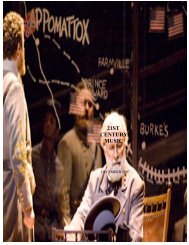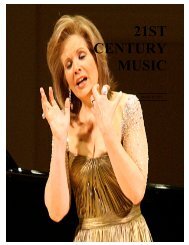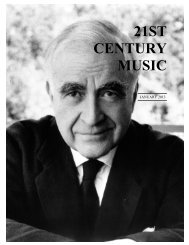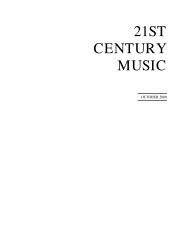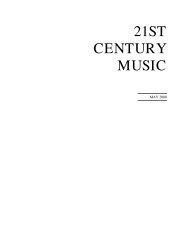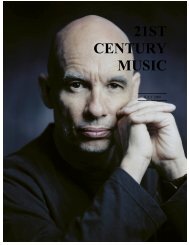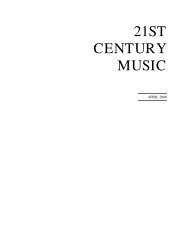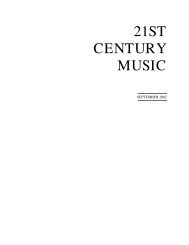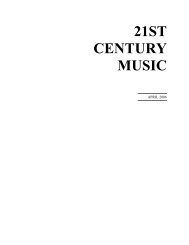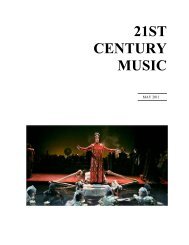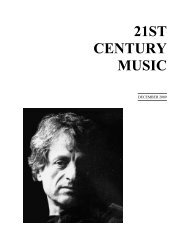You also want an ePaper? Increase the reach of your titles
YUMPU automatically turns print PDFs into web optimized ePapers that Google loves.
Remembering Alan Hovhaness:<br />
Making the Right Connections<br />
RICHARD KOSTELANETZ<br />
A sacred art, a pathway of life through a living<br />
universe, merging East and West, heaven and earth,<br />
addressed not to the snobbish few but to all people as<br />
an inspiration in their journey through the universe. --<br />
Alan Hovhaness<br />
Alan Hovhaness was a major American composer for more<br />
than a half century, a figure forever on the professional fringe,<br />
but always doing beautiful music; and it is perhaps fitting that<br />
he celebrated his 80th birthday nine years ago with the CD<br />
release of two of his strongest pieces, Symphony No. 2<br />
("Mysterious Mountain") and Lousadzak, the former recorded<br />
by Dennis Russell Davies conducting the American<br />
Composers Orchestra and the latter by the eminent pianist<br />
Keith Jarrett accompanied by Davies' orchestra.<br />
These two pieces represent Hovhaness as his best, with long<br />
regal lines on modal scales reminiscent of Eastern music, full<br />
not only of melodic energy but emotion unique to music,<br />
which is to say his compositions seem full of feeling without<br />
being programmatic with specific sentiments. It is beautiful<br />
music that rarely becomes slick, ingratiating music that never<br />
insinuates; it can be listened to again and again. That is one<br />
reason why performers, at all levels of competence, like it.<br />
About Jarrett's playing, he told me, "I think the performance of<br />
the piano concerto marvelous -- Lousadzak (which he<br />
pronounces "Lou-sa-DZAK"), the dawn of light, in other<br />
words the coming of light, the coming of philosophy, the<br />
coming of a new experience. Really good jazz musicians are<br />
more aware of the Indian music and improvisational music<br />
that were always an inspiration to me."<br />
Shortly after this release, I found Hovhaness and his wife, the<br />
soprano Hinako Fujihara, in Seattle where he had moved<br />
nearly two decades previously, having lived before in places<br />
as various as Boston, New York, and Lucerne, Switzerland.<br />
No less slender and frail-looking than he was a decade before,<br />
the last time I saw him, he greeted me at the door of his<br />
handsome ranch house not on fashionable Mercer Island, say,<br />
but banked into a hill near the airport in South Seattle. To the<br />
background sound of the main highway below his windows,<br />
while airplanes buzzed overhead, he showed me the panorama<br />
that made him purchase that house, the view that he finds so<br />
inspirational. "You can see the entire Cascade Mountains from<br />
Mount Rainer in the south to Mount Baker in the north. It's<br />
very much like Switzerland. This is a place I'm happy living<br />
in." In the open space that runs from the end of the kitchen<br />
around the bedroom was a piano, a work table, a television, an<br />
audio console, and continuous windows, which is to say<br />
everything this composer needs.<br />
Seattle is quite distant from Somerville, Massachusetts, where<br />
he was born March 8, 1911, Alan Vaness Chakmakjian, the<br />
son of a chemistry professor who had immigrated to the<br />
United States from Adana, Turkey. The composer's mother,<br />
born Madeleine Scott, was of Scottish ancestry. When their<br />
only child was five, the Chakmakjians moved to another<br />
Boston suburb, Arlington, where young Alan attended the<br />
public schools. "When I was four years old I wanted to be an<br />
astronomer," he explained between sips of coffee. "Then I<br />
heard a good piece of music -- the songs of Schubert. That was<br />
the first time I heard something that wasn't a Baptist hymn."<br />
After graduating from high school in 1929, he went to Tufts<br />
University for two years, but then transferred to the New<br />
England Conservatory of <strong>Music</strong>, where he studied with<br />
Frederick Converse (1871-1940), a now-forgotten American<br />
composer whose most noted piece, The Mystic Trumpeter<br />
(1905), is an orchestral work based on Walt Whitman. Soon<br />
after his mother's death in 1931, he changed his middle name<br />
to "Hovaness" (accented on the second syllable), which is<br />
Armenian for John or Johannes, in honor of his grandfather<br />
whose first name it was. Then he decided to add another H to<br />
his middle name and completely drop his last name, thus<br />
producing his present professional name, Alan Hovhaness,<br />
which is pronounced with the accent on the last syllable (Hovan-ESS).<br />
He has no academic degrees, other than honorary<br />
doctorates.<br />
Unlike other American tonal composers of his generation,<br />
Hovhaness never studied in Europe. "I was more interested in<br />
Oriental music," he remembered. "Things like that were very<br />
far from Paris." His first revelation came in 1936 when he<br />
closely observed Vishnu Shirali, the North Indian musician<br />
who had come to Boston with the dancer Ude Shankar (Ravi's<br />
older brother). During the 1930's, Hovhaness made his living<br />
playing the piano, mostly around Boston, for whomever would<br />
hire him, including social gatherings of Greeks, Arabs, and<br />
Armenians. He also worked as a jazz arranger on the Works<br />
Progress Administration and as an organist in an Armenian<br />
church, where he acquired a reputation for spectacular<br />
improvisations on ancient modes. In 1940, the young Boston<br />
composer destroyed nearly all the music he had written thus<br />
far, including an undergraduate prize-winning symphony; he<br />
wanted to start the new decade afresh.



